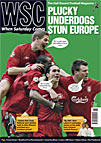 Dan Brennan reports on the fall of a Soviet-era bureaucrat and rise of a new national coach, as Russians stage football revolutions at home as well as at Stamford Bridge
Dan Brennan reports on the fall of a Soviet-era bureaucrat and rise of a new national coach, as Russians stage football revolutions at home as well as at Stamford Bridge
This spring a wind of change is sweeping through the dusty corridors at the top of Russian football. On April 2, Vitaly Mutko replaced Vyacheslav Koloskov, president of the Russian Football Union, who reigned, seemingly untouchably, over the Russian and Soviet game for a quarter of a century.
Koloskov, an old-school Brezhnevite apparatchik, enjoyed favour with the bureaucrats of UEFA and FIFA but had come to be increasingly disliked by Russia’s current rulers. Mutko, by contrast, is a career politician, who enjoys the support of President Putin (though baulks at accusations that he is a “Kremlin puppet”). He earned his football stripes as president of Zenit St Petersburg, then as head of the Russian Premier League. He also appears to be in with the oligarchs and has already hinted at a place for Roman Abramovich and his millions as he hopes to usher in “the dawn of a new era for Russian football”.
Cosying up to the oligarchs won’t make Mutko universally popular, but few would fault him on his first major achievement, as he convinced Yuri Syomin, Lokomotiv Moscow’s long-serving head coach, to head up the national team. Syomin’s task will be to turn the tide on two decades of underachievement. More immediately he has somehow to get Russia’s flagging World Cup qualification campaign back on track.
Handed the role of mid-term saviour, Syomin finds himself in a position not dissimilar to the one inherited by his predecessor Georgi Yartsev, who worked a minor miracle by rescuing Russia’s Euro 2004 qualification campaign. But having got them to Portugal he then failed to stop things descending into farce. He surprisingly survived, only to make another trip to Portugal, for a World Cup qualifier last year, where a woeful Russia were humiliated 7-1 – their worst international defeat. The denouement was destructively long and painful: Yartsev clung on to preside over an underwhelming 2-1 win in Liechtenstein then, in March, a draw in the former Soviet republic Estonia. It means that, halfway through the qualification cycle, Russia lie third, three points behind joint leaders Portugal and Slovakia, but still needing to play both again and with Latvia breathing down their necks.
By endorsing Syomin, the Russians have shown that local does not always mean parochial. Urbane and intelligent, he resembles a Slav Arsène Wenger. On recent achievements he is, bar none, the most accomplished coach on the Russian circuit, having led Lokomotiv Moscow – not long ago the lowliest of the capital’s clubs – to two league titles in three seasons.
Mutko sensibly resisted the clamour for a foreign saviour. Gérard Houllier and Otto Rehhagel were among the mooted, but such experiments have largely failed at club level. With the admirable exception of Czech Vlastimil Petrzela at Zenit, last season’s influx of foreign coaches – Italian Nevio Scala at Spartak, Portuguese Artur Jorge at CSKA and Frenchman Roland Courbis at Alania – are all now gone, having taken big salaries and given little in return.
Syomin was always the most logical choice. The tough part was getting him to part company with his beloved Lokomotiv Moscow after 16 years. Not least, perhaps, because his salary with the federation is a relatively meagre $20,000 (£10,500) per month, far less than at Lokomotiv and less than a day’s pay for his England counterpart. Syomin had initially wanted to do both jobs, but the RFU stood firm. Presumably there will be substantial bonuses built into Syomin’s incentive package, but the Russians are lucky that their man appears to be driven primarily by the challenge ahead rather than his bank balance.
In a country where national-team selection has often been tainted by suspicion of club bias, Syomin is widely regarded as a meritocrat and has promised to widen the net in his search for new players. One problem is the diminished local talent pool, as Russia’s cash-rich premier league attracts ever more mercenaries from Africa, South America and Eastern Europe. Syomin, pragmatically, says he is ready to make use of FIFA’s lax rules on nationality. “I don’t exclude the inclusion of naturalised players in the national team. If a foreign player hasn’t played for his own country and is clearly better than any Russian options, then we’ll ask him if he would be so kind as to play for us.”
In 2000, national coach Oleg Romantsev considered naturalising Spartak Moscow’s Brazilian forward Luis Robson, but nothing came of it. Five years on, the number of quality exiles in Russia has grown hugely so Syomin could put together a sizeable list of candidates. Both FC Moscow’s Argentinian striker Hector Bracamonte and CSKA Moscow’s Brazilian midfielder Daniel Carvalho have recently intimated that they would consider switching allegiance. If Syomin can succeed in rebuilding a team capable of reaching Germany next year, few will care how he does it.
From WSC 220 June 2005. What was happening this month